All products featured are independently chosen by us. However, SoundGuys may receive a commission on orders placed through its retail links. See our ethics statement.
Best Apple AirPods Pro alternatives
June 24, 2024

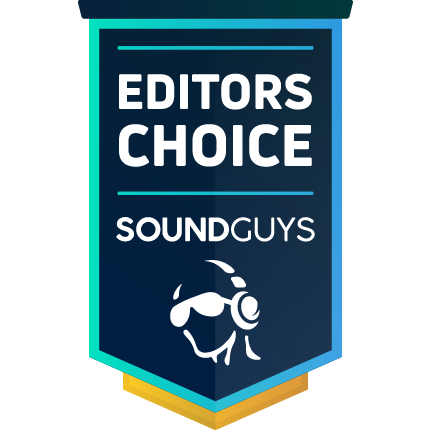






Take SoundGuys’ quiz to find your best fit
True wireless earbuds have matured over the past few years. With the release of the Apple AirPods Pro (1st generation) and, more recently, the AirPods Pro (2nd generation), companies are thinking of creative ways to outdo Apple. We’ve put together a list of the best Apple AirPods Pro alternatives, and our picks include those with noise canceling, H1 chip integration, and more. Let’s dive in and see what true wireless earbuds are the best options for you.
What's new?
- This list of the best AirPods Pro alternatives was updated on June 24, 2024, to add more specs to the top picks.
- Apple updated the AirPods Pro (2nd generation) in 2023 with USB-C and new software features, which may factor into your decision-making.
Take SoundGuys’ quiz to find your best fit
Why is the Sony WF-1000XM5 the best set of AirPods Pro alternatives?
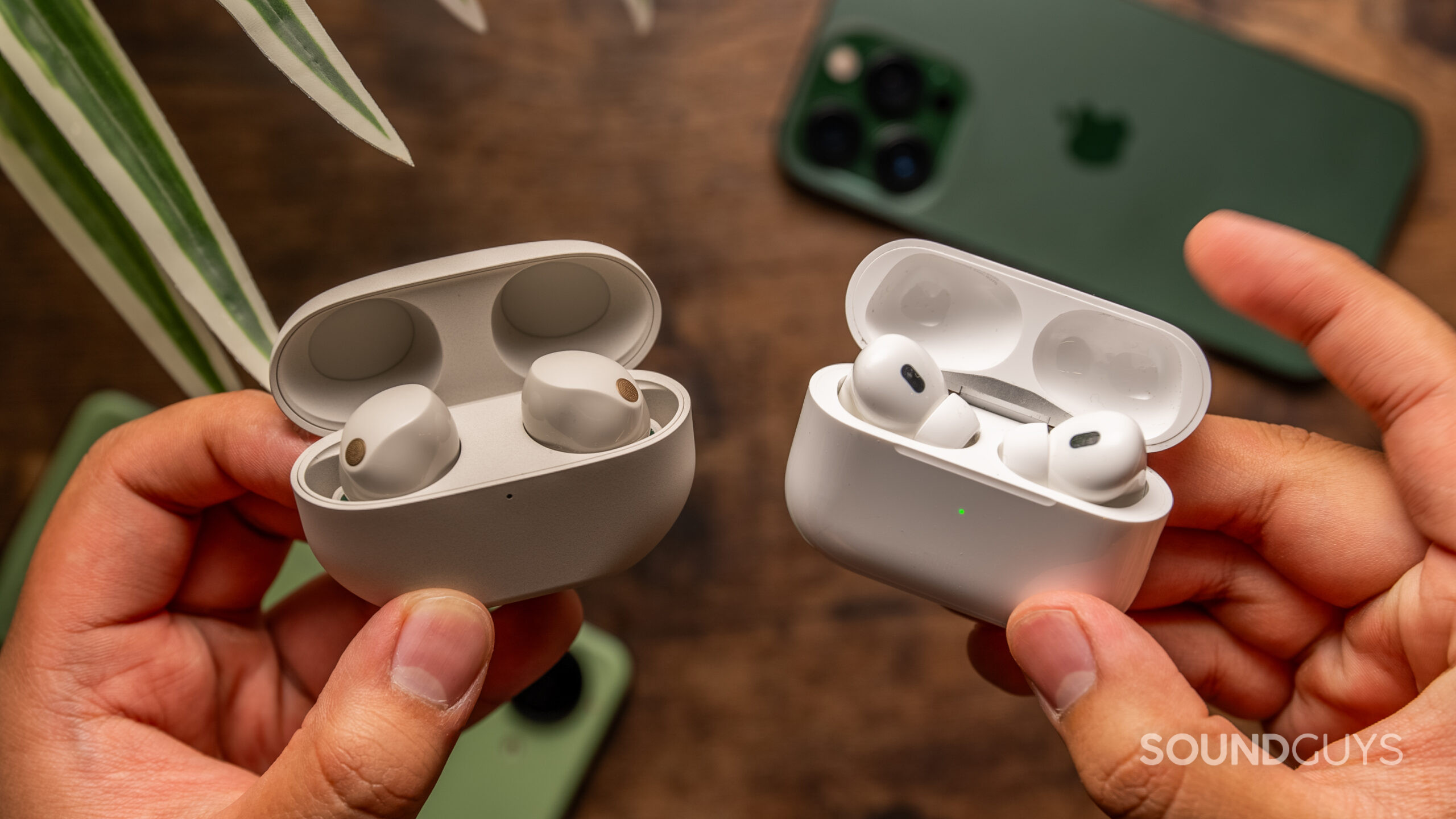
Your search for the best noise canceling true wireless earbuds ends with the Sony WF-1000XM5 as long as you can afford it. If you spend a lot of your workweek traveling by plane or are just plain sick of the eardrum-numbing rattle of your public transit system, Sony’s buds are about to be your new best friend. These earbuds effectively quiet low frequencies from 50Hz and higher and will sound roughly one-quarter to one-sixteenth as loud as they would be compared to wearing nothing in your ears.
The Sony WF-1000XM5 earbuds have an IPX4 rating and come with four pairs of polyurethane foam ear tips, so this can be a great set of workout earbuds, too. It is also one of the few headsets to use Bluetooth 5.3, which gives you access to LE Audio and Sony’s higher-quality LDAC Codec. Other features include smart assistant integration, speak-to-chat, transparency mode, and 360 Reality Audio (which is similar to Apple’s spatial audio). If you’re displeased with the default frequency response, you can create a custom EQ through the Sony Headphones Connect app (iOS/Android). You can also remap the touch controls in the app.


- Battery life: 9 hours and 32 minutes.
- Connectivity: Bluetooth 5.3 (SBC, AAC, LDAC, or LE Audio.) with Multipoint.
- Protected against: Water resistant (IPX4)
- Weight: 6g per earbud.
The chart below shows how the sound of the Sony WF-1000XM5 was assessed by the Multi-Dimensional Audio Quality Score (MDAQS) algorithm from HEAD Acoustics.
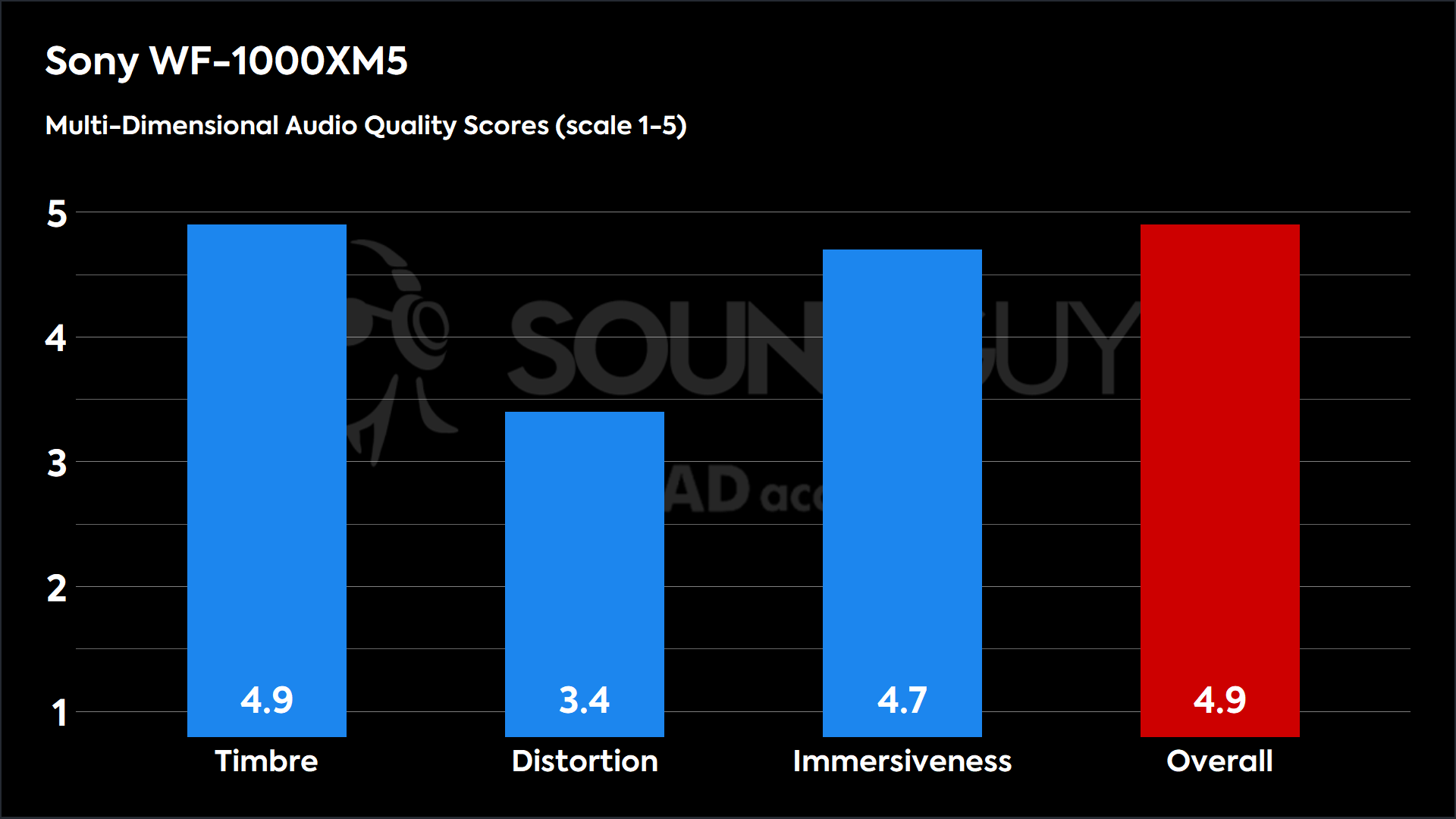
Loading chart ...
Testing on our B&K 5128 artificial head reveals that the Sony WF-1000XM5’s frequency response barely deviates from our headphone preference curve, mainly at the low end (the left side of the chart). There is a noticeable emphasis between 30-300Hz. The earbuds also retain vocal and instrument clarity even when bass instruments get loud.
Sony’s embedded mic systems are quite good, and the same goes for the WF-1000XM5. When there’s background noise, such as wind or the office sounds in the second sample below, the microphones really struggle to transmit voices clearly.
Take a listen to our standardized mic samples and vote in our mic poll below.
Sony WF-1000XM5 microphone demo (Ideal conditions):
Sony WF-1000XM5 microphone demo (Reverberant Space):
Sony WF-1000XM5 microphone demo (Office conditions):
Sony WF-1000XM5 microphone demo (Street conditions):
Sony WF-1000XM5 microphone demo (Windy conditions):
How does the microphone sound to you?
The Sennheiser MOMENTUM True Wireless 4 has some of the best noise canceling
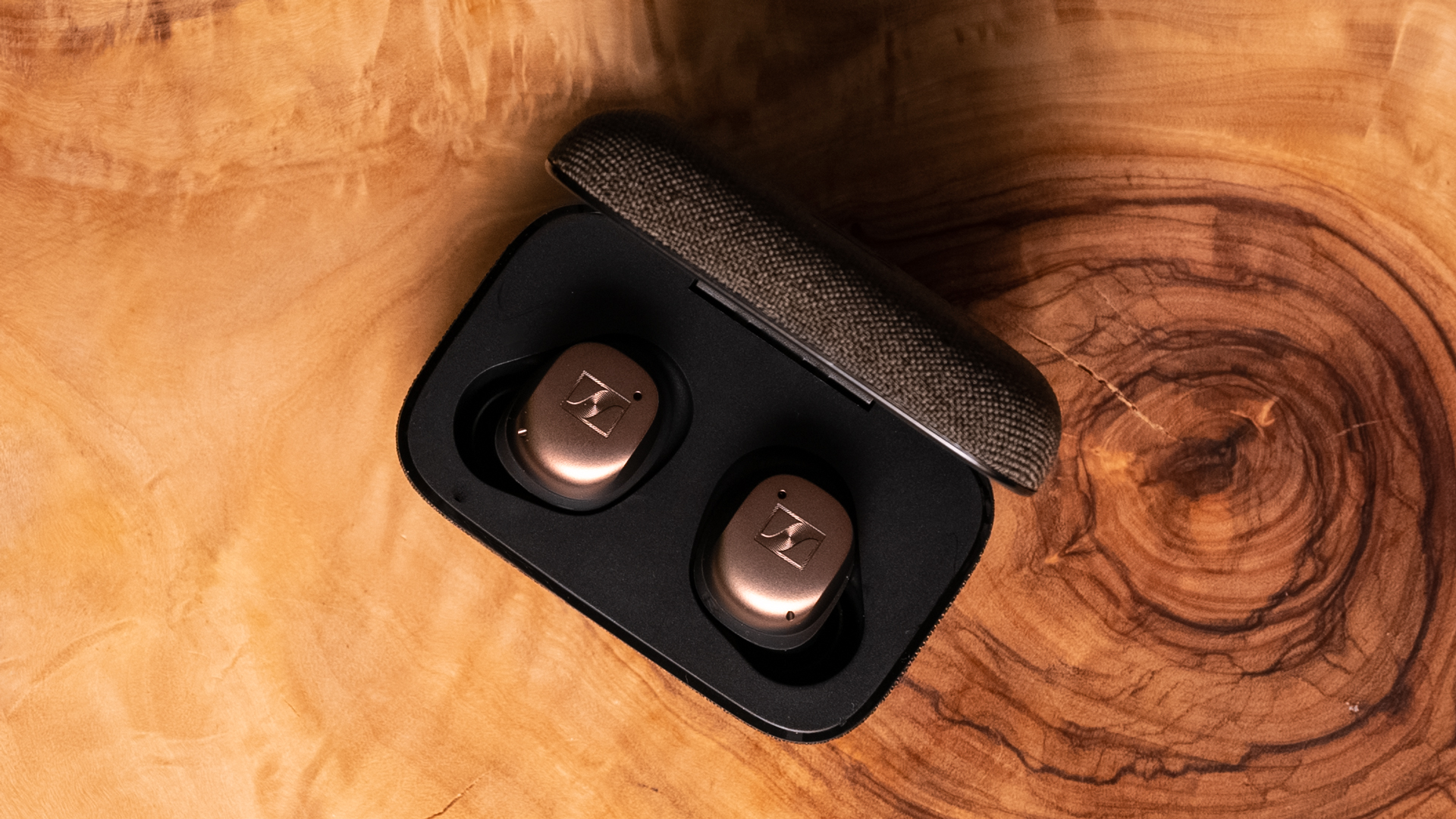
The Sennheiser MOMENTUM True Wireless 4 earbuds stand out as a top alternative to Apple AirPods, especially for users seeking superior noise cancelation and sound quality. These earbuds feature advanced active noise canceling (ANC) technology, delivering an average of 83% noise attenuation. Coupled with a secure and customizable fit, this ensures an immersive listening experience. They support the latest Bluetooth 5.4 and high-quality codecs like aptX Adaptive, enhancing their appeal to Android users.
The earbuds are designed for audiophiles willing to invest in premium sound and build quality. They offer over 7 hours of battery life with quick charging, an IP54 rating for moisture resistance, and customizable controls via the Sennheiser Smart Control app.
Perfect for tech enthusiasts and audiophiles, the Sennheiser MOMENTUM True Wireless 4 combines style, advanced technology, and robust ANC capabilities, making them an excellent high-end alternative to traditional AirPods.


- Battery life: 7 hours and 45 minutes.
- Connectivity: Bluetooth 5.4 (SBC, AAC, aptX Adaptive, aptX Lossless, or LC3 and LE Audio).
- Protected against: Water and dust resistant (IP54).
- Weight: 6.2g per earbud.
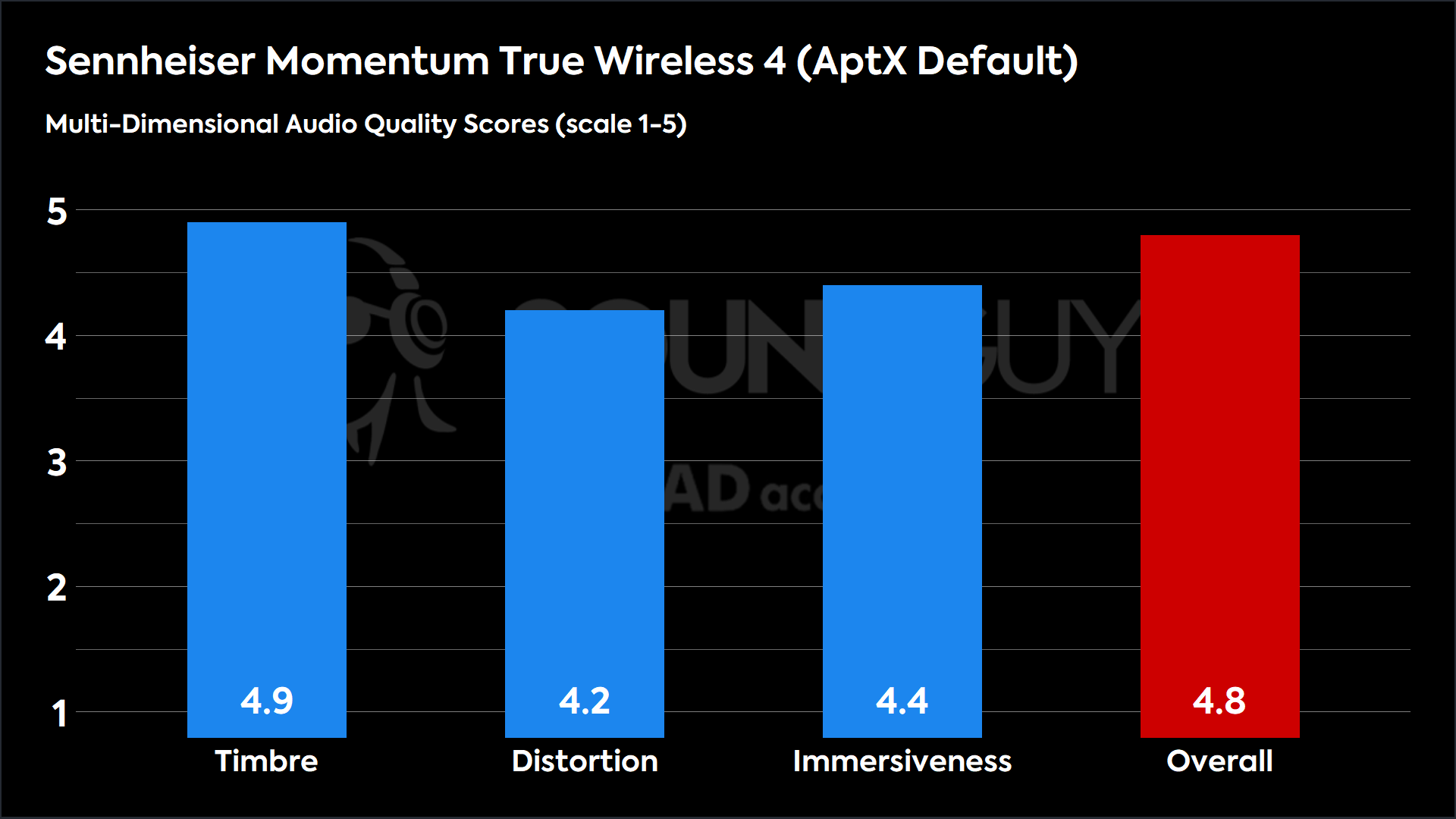
Loading chart ...
The objective measurements here are relatively close to what we like to see. In the lows, a minor emphasis should make basslines, low vocals, and bass guitar fundamentals easier to hear in the cacophony of a busy mix. However, there’s a high-end underemphasis where we like to see higher levels. Specifically, in the 2-4kHz region, a bit of emphasis is helpful for speech intelligibility and general clarity.
The Bose QuietComfort Ultra brings the bass
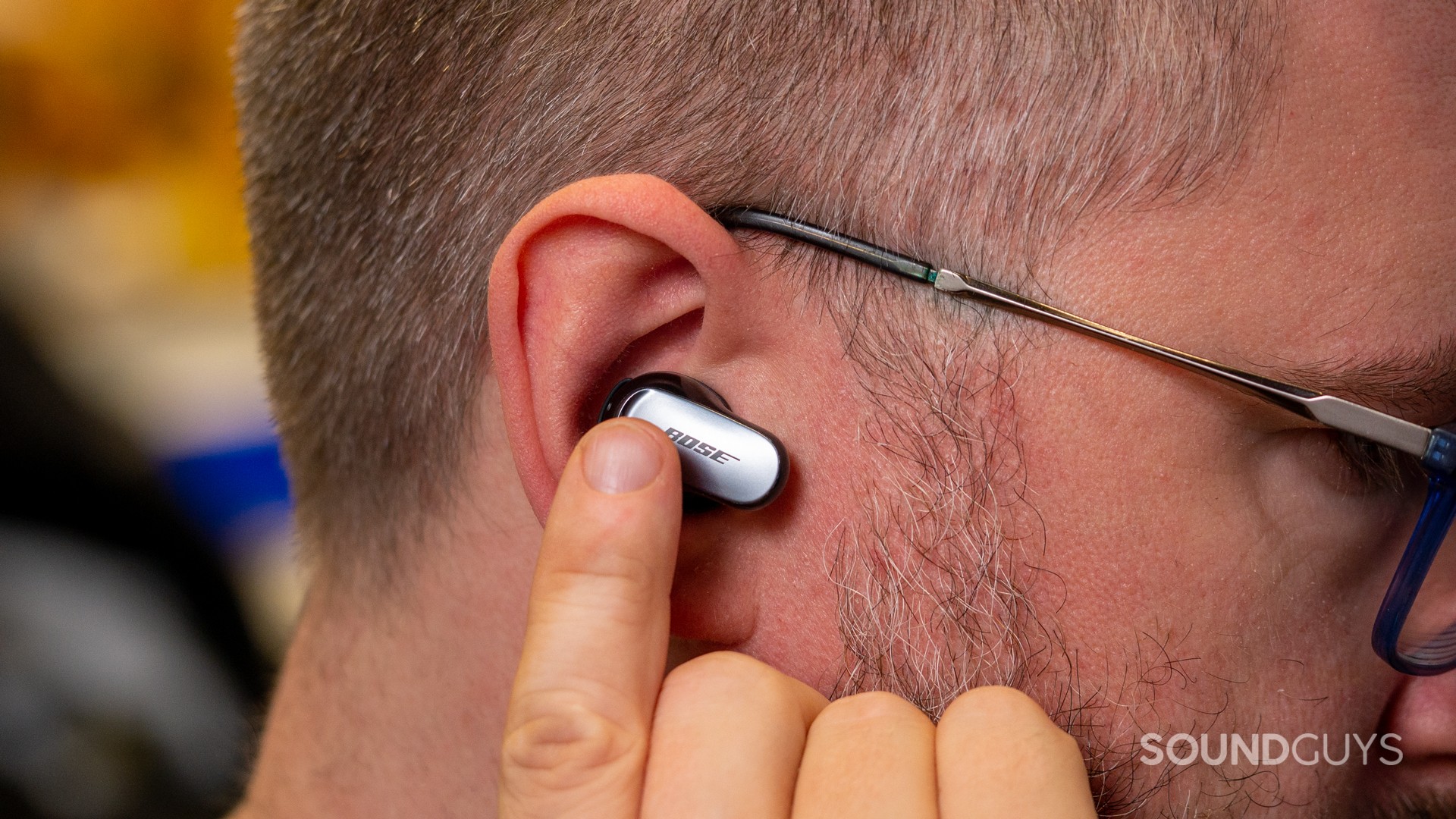
If you own an iPhone, anything other than AirPods is going to lose out on iOS-oriented features. Still, if you value noise canceling above all else, going with something outside the walled garden can be worth it. The Bose QuietComfort Ultra earbuds rival the Apple AirPods Pro by not only canceling low and high frequencies better but also isolating you from your surroundings excellently. The ovoid nozzle shape and ear tips fit ears quite well, which has several benefits to your listening.
Like the AirPods Pro, these premium earbuds have a spatial audio feature via their companion app to help create a more immersive listening experience. The default sound out of the box is definitely very bass-heavy, but you can tinker with the app’s EQ to fix that. If you’re using a relatively new Android phone, the Bose QuietComfort Ultra Earbuds should be on your radar. Support for Snapdragon Sound and Bluetooth 5.3 will enable future features that could pay off over time.

- Battery life: 6 hours and 11 minutes.
- Connectivity: Bluetooth 5.3 (SBC, AAC, aptX Adaptive, and Snapdragon Sound. LE Audio)
- Protected against: Water resistant (IPX4).
- Weight: 7.1g per earbud.
The chart below shows how the sound of the Bose QuietComfort Ultra Earbuds was assessed by the Multi-Dimensional Audio Quality Score (MDAQS) algorithm from HEAD Acoustics.
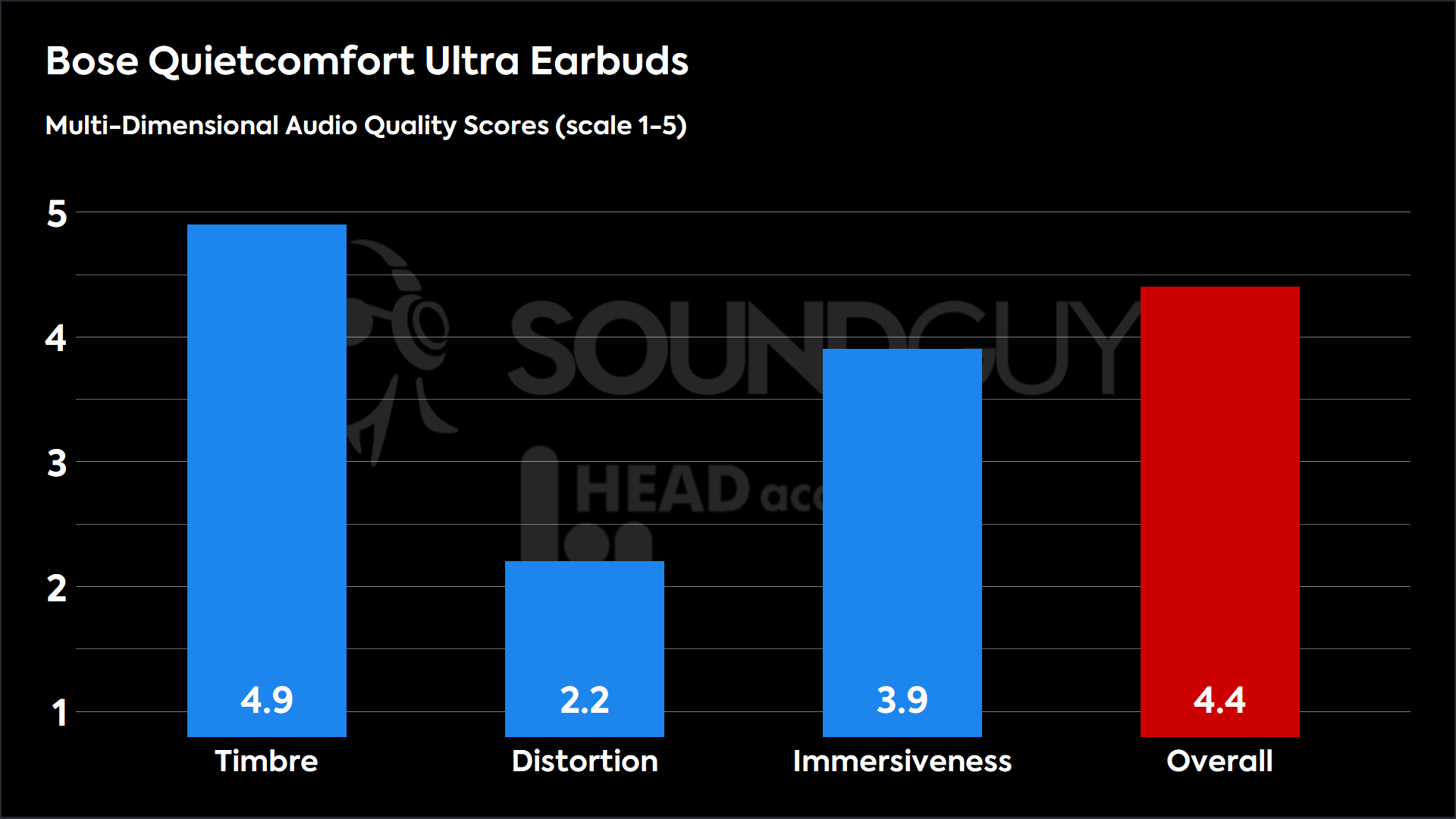
Loading chart ...
Compared to our headphone preference curve, the Bose QuietComfort Ultra Earbuds have a strong over-emphasis in both the bass and the treble regions. They peak surpassing 14dB around 30Hz, which is about 10dB more than we would like to see in the low-end, and again around 2,500Hz.
The Beats Fit Pro is perfect for athletes
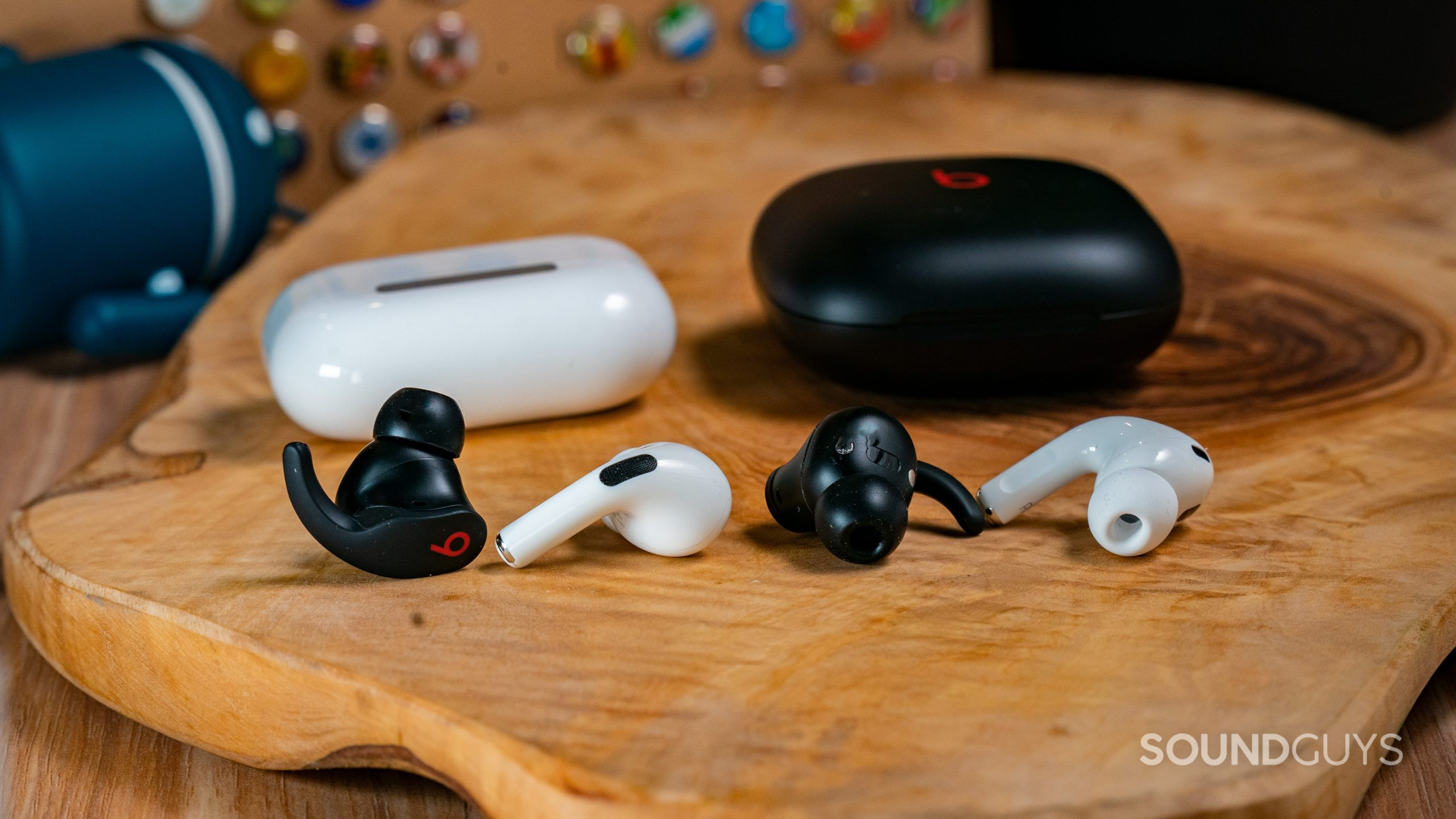
The Beats Fit Pro is great for any workout because of its ear hooks and IPX4 rating. You can sweat and jump around all you want with these earbuds, and they’ll stay in place just as they should. The earbuds have excellent battery life with up to 6 hours with ANC on, and you get an extra three charge cycles (18 hours) from the case for a combined battery life of 24 hours. Plus, you get wireless charging to boot.
Like other Apple products, yes, Apple owns Beats; the FitPro uses the H1 chip for Spatial Audio, hands-free Siri access, Audio sharing, Find My functionality and more. You get automatic play/pause when you use it with an iPhone, and any user can enjoy the bassy frequency response. This is perfect for exercise since bass is typically what we keep our ears out for during cardio or even calisthenics.

- Battery life: 6 hours and 22 minutes with ANC on.
- Connectivity: Bluetooth 5.0 (SBC and AAC).
- Protected against: Water resistant (IPX4)
- Weight: 5.6g per earbud.
The chart below shows how the sound of the Beats Fit Pro was assessed by the Multi-Dimensional Audio Quality Score (MDAQS) algorithm from HEAD Acoustics.
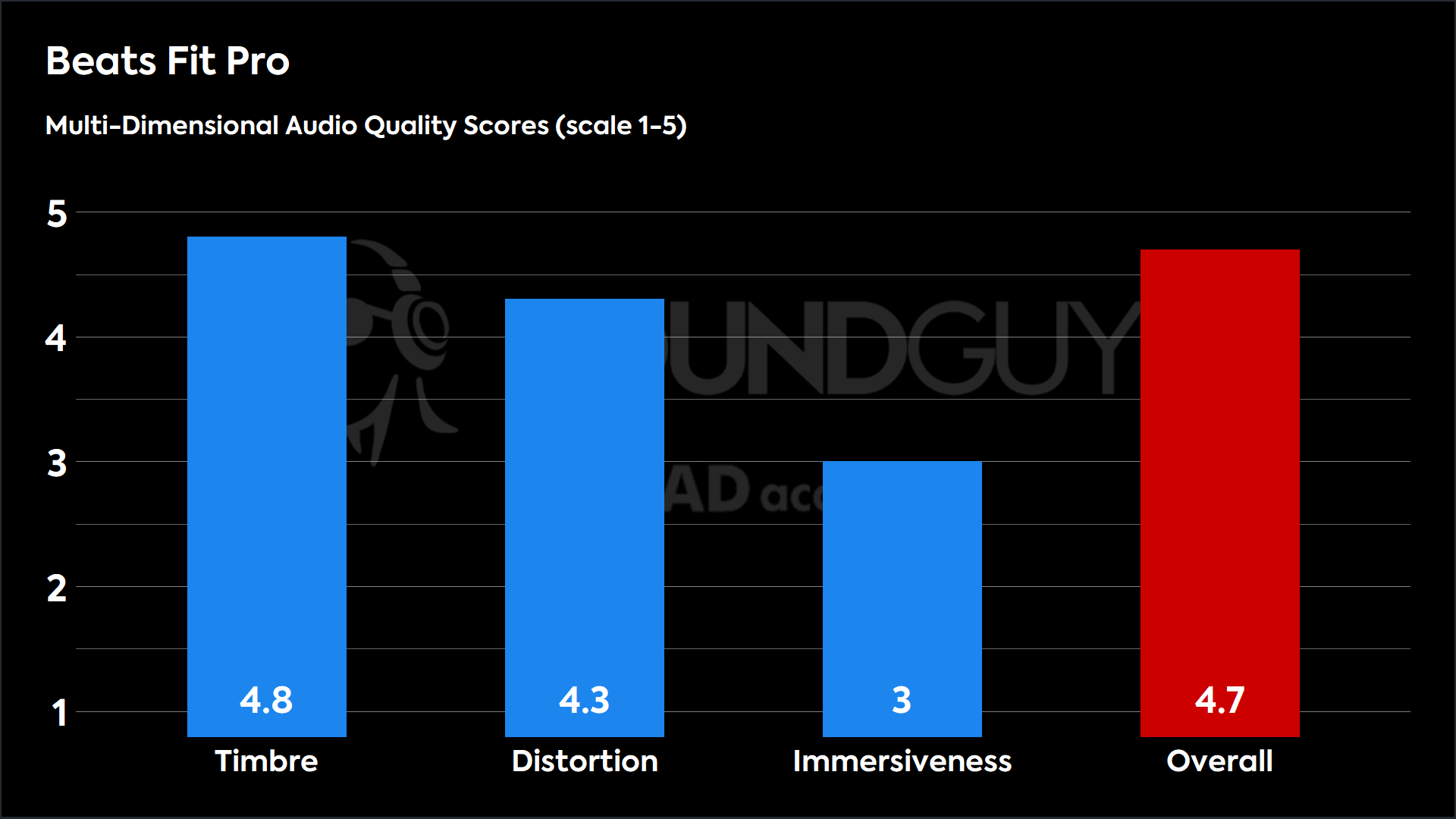
Loading chart ...
You get plenty of bass emphasis, which is typical of workout earbuds. Beats keep the treble emphasis pretty consumer-friendly, so you can still hear flutes, violins, and hi-hats amid bassier segments. This kind of frequency response does best with pop, hip-hop, and rap music, and it’s no coincidence that these are the most popular workout music genres.
The Nothing Ear is a high-value AirPods Pro alternative
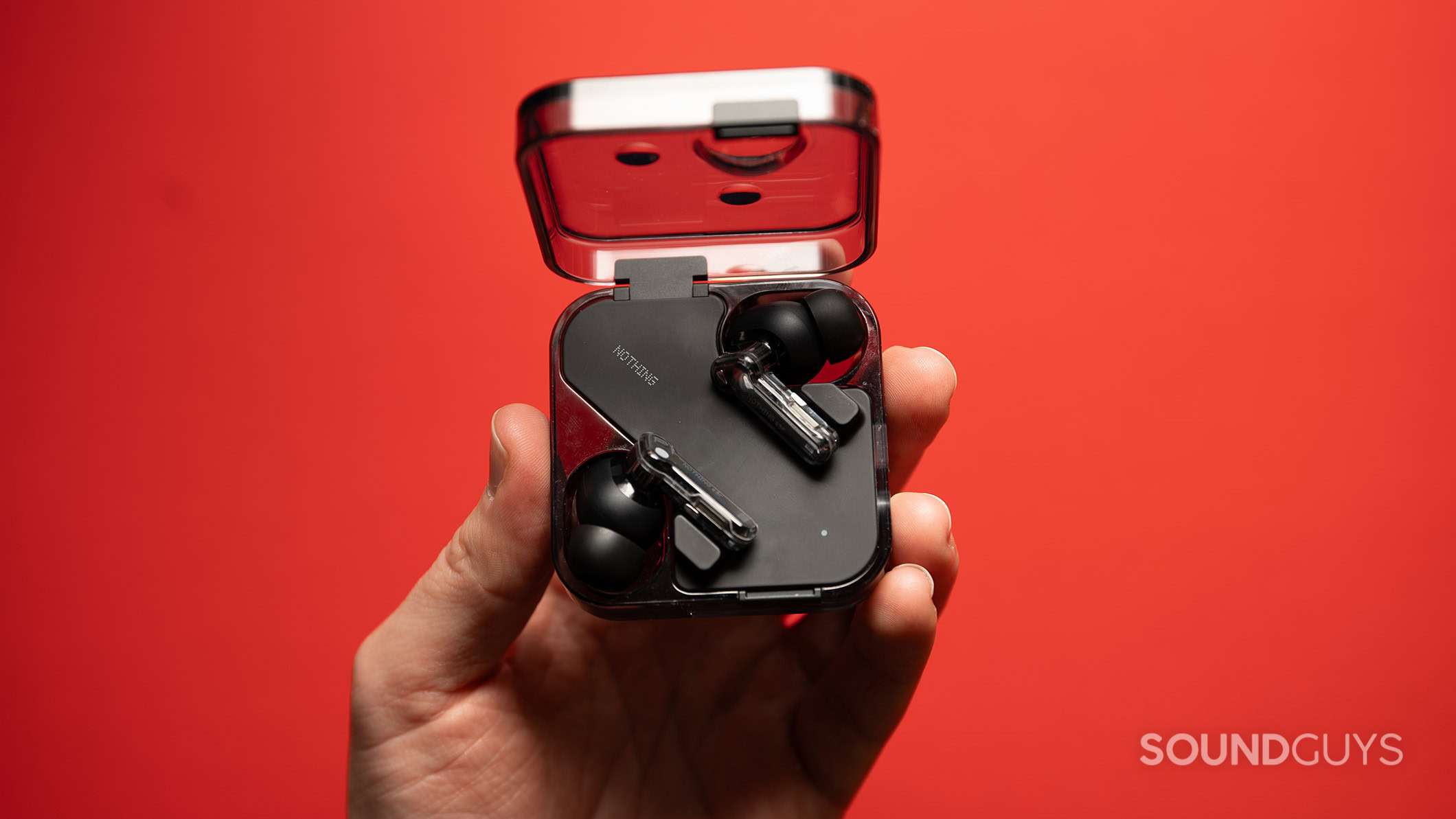
The new Nothing Ear offers an excellent blend of features and performance at a reasonable price point, making it a great bang for your buck option. These earbuds boast a sleek, transparent design that is both lightweight and comfortable for extended wear. They deliver impressive sound quality, thanks to their 11mm ceramic diaphragm drivers that provide exceptional clarity and a wide, immersive soundstage. The companion app offers a wealth of customization options, including an advanced parametric equalizer and a personalized sound profile feature that adjusts the audio based on your hearing.
In addition, the Nothing Ear earbuds are equipped with impressive noise cancelation capabilities, reducing environmental noise by up to 75%. They also feature a natural-sounding transparency mode for situational awareness. With support for high-quality Bluetooth codecs like LHDC and LDAC, these earbuds cater to audiophiles seeking a wire-free listening experience. The battery life is respectable, lasting around 8 hours on a single charge, and the charging case provides additional charges for extended use. Overall, the Nothing Ear delivers a compelling package of features, sound quality, and value, making it a standout choice for those seeking a premium wireless audio experience without breaking the bank.
- Battery life: 8 hours and 4 minutes.
- Connectivity: Bluetooth 5.3 (AAC, SBC, LHDC 5.0 and LDAC). Auracast.
- Protected against: Water and dust resistant (IP54).
- Weight: 4.6g per earbud.
The chart below shows how the sound of the Nothing Ear was assessed by the Multi-Dimensional Audio Quality Score (MDAQS) algorithm from HEAD acoustics.
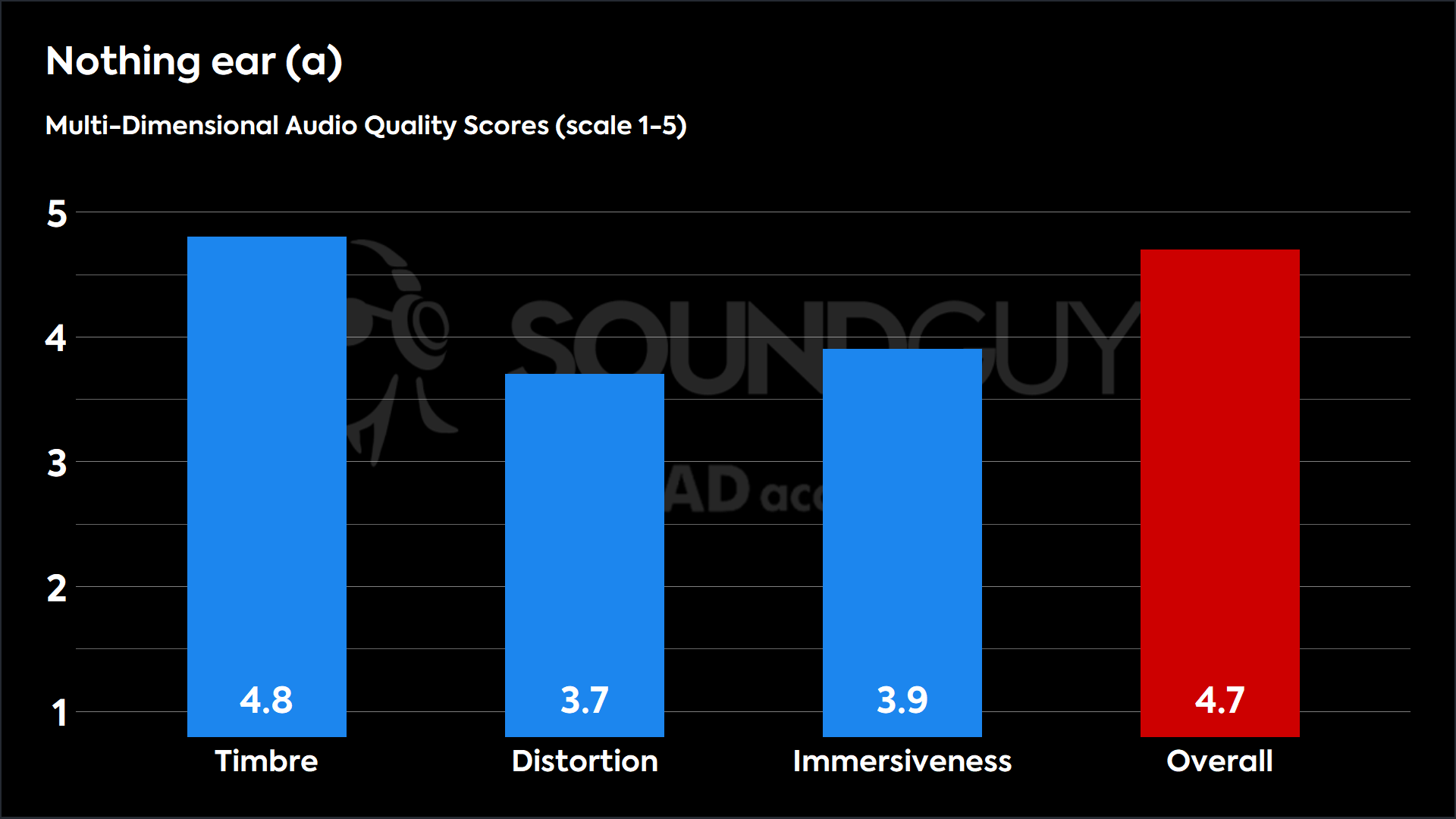
Loading chart ...
As you can see in the chart above, the Nothing Ear has a default frequency response that amplifies low frequencies above our headphone preference curve. There is also a drop in output around 470Hz and a boost around 5.5kHz compared to our preference. You can easily equalize these variances using the advanced equalizer.
Should you get the Beats Studio Buds Plus instead of the AirPods Pro?
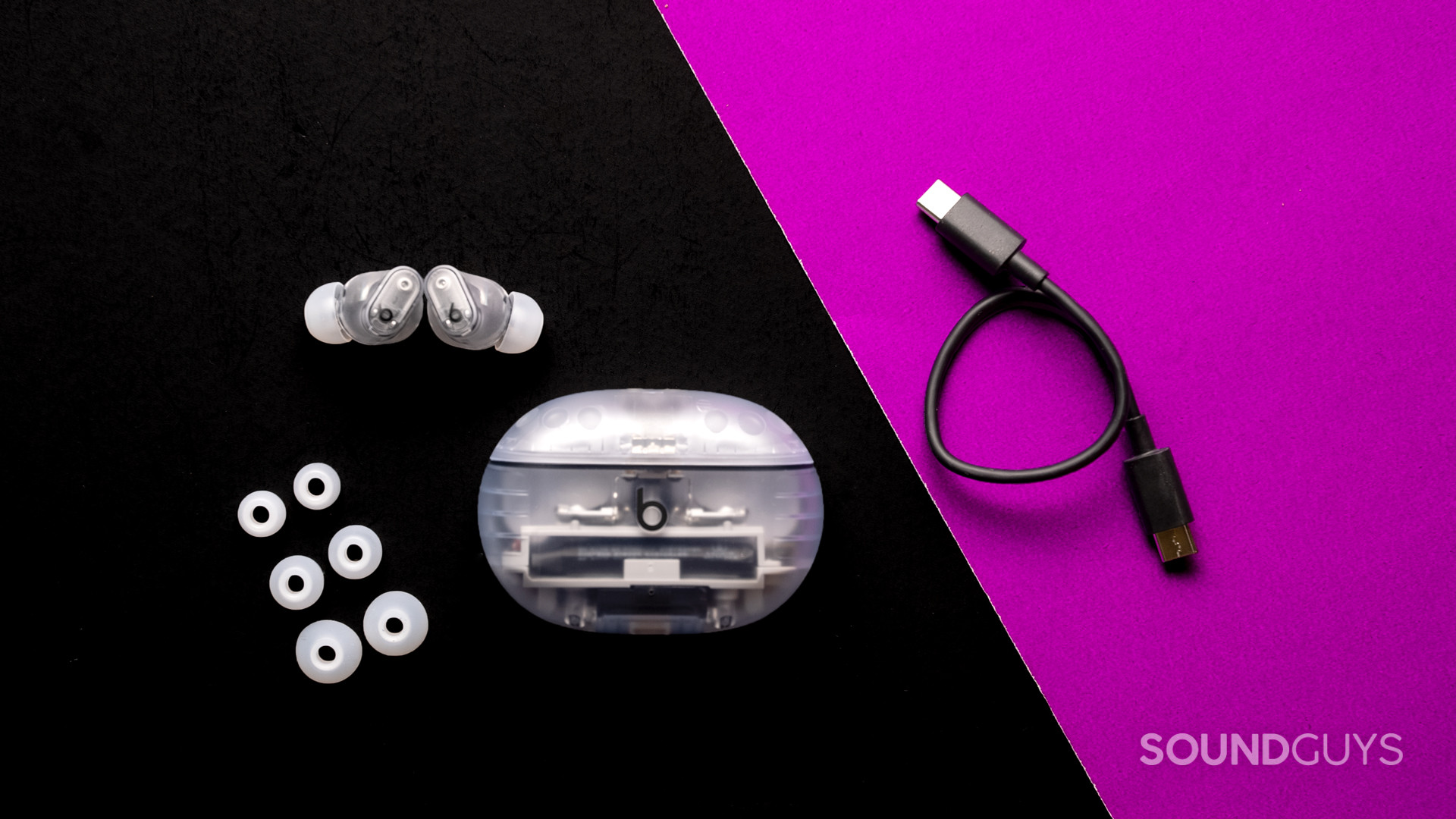
Riffing off of the success of the original Beats Studio Buds, the newer Beats Studio Buds Plus retains nearly the same form factor and a reasonable 5-gram per bud weight. These sound pretty decent and have a much-improved noise canceling system. Unlike other Beats, these lack an H1 or H2 chip and work just as well with Android as iOS.
Button controls are the most annoying thing about these earbuds. If you don’t mind those, the 8 hours and 22 minutes of battery life will surely impress everyone and surpass the AirPods Pro (2nd generation) battery life.

Should you get the Apple AirPods 3 instead of the AirPods Pro?
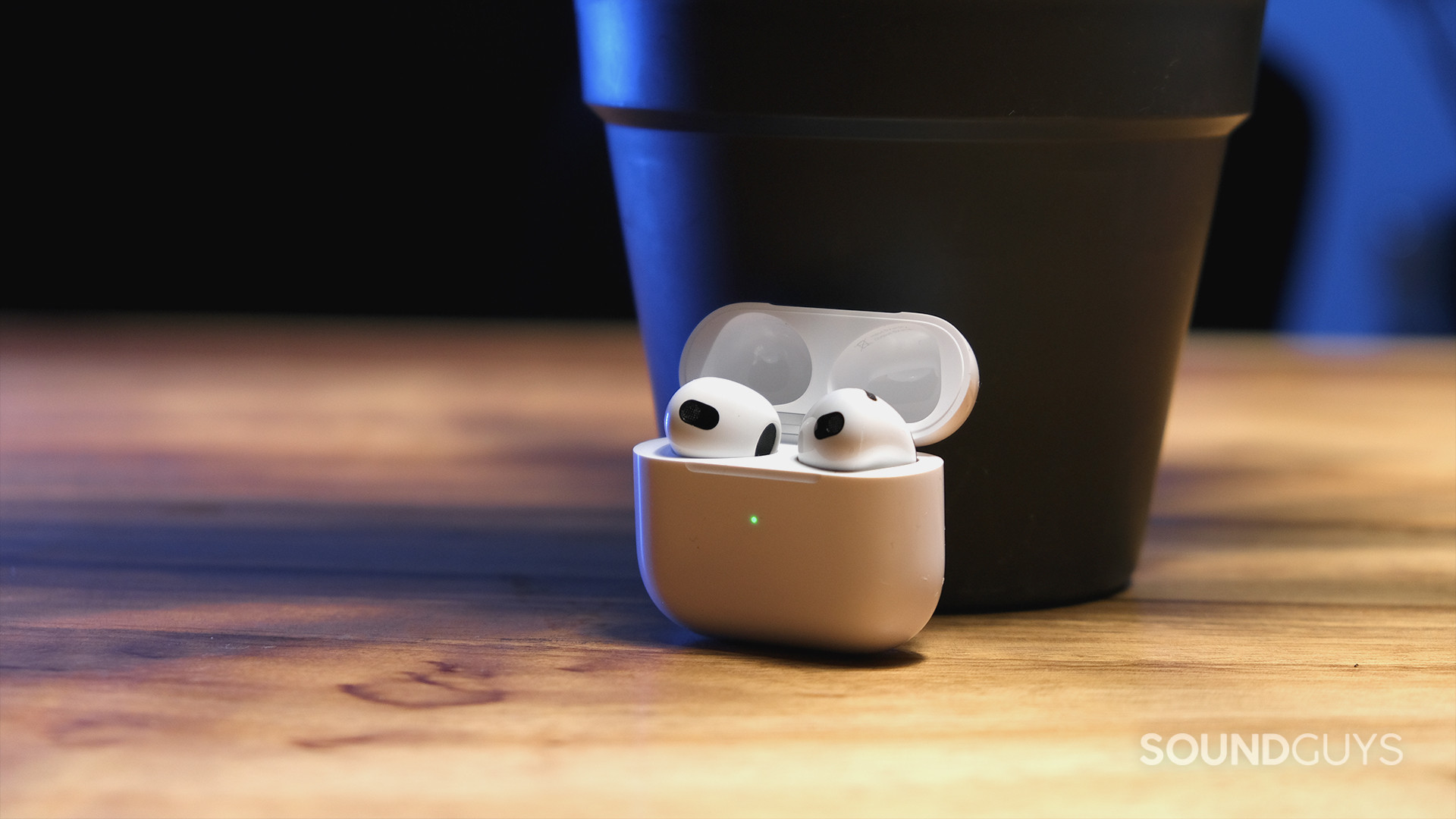
The Apple AirPods (3rd generation) borrows many of its features and design from the flagship AirPods Pro. With shortened stems, force sensor controls, and an IPX4 build, it may be hard to tell the AirPods (3rd generation) apart from the Pro model — that is until you remove the earbuds from your ear. The third-gen AirPods feature the same open-type fit as previous AirPods. If you want a comfortable, reliable fit, then the AirPods Pro is the best option, no question. There are also plenty of AirPods alternatives worth checking out.
The AirPods (3rd generation) versus AirPods Pro (2nd generation) debate isn’t that simple, though: the unsealed fit of the newest AirPods keeps you safe and aware of your surroundings at all times. What’s more, Apple claims you get up to 6 hours of playtime on a single charge, which is better than the AirPods Pro. The biggest advantage that the AirPods (3rd generation) has over the Pro is the price.
Both AirPods include a MagSafe wireless charging case with an analog Lightning input, and both feature Dolby Atmos spatial audio with head tracking for immersive music and video playback from compatible services. Again, the biggest difference between these sets of earbuds is the fit and ANC capabilities, or lack thereof.
With the release of the AirPods Pro (2nd generation), there’s even more to discuss, given the vast improvement over the last generation of the AirPods Pro. To see how the AirPods Pro (2nd generation) compares to the AirPods (3rd generation), check out our comparison.
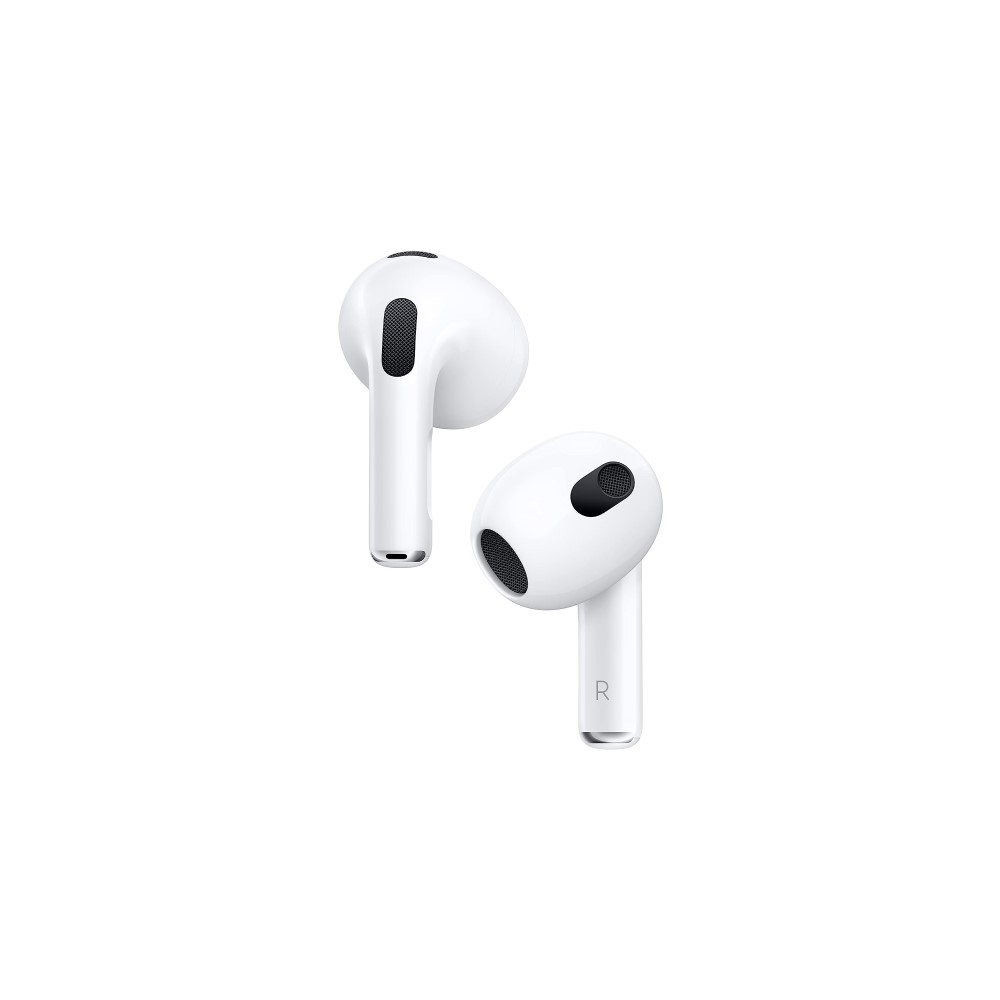
The chart below shows how the sound of the Apple AirPods 3 was assessed by the Multi-Dimensional Audio Quality Score (MDAQS) algorithm from HEAD Acoustics.
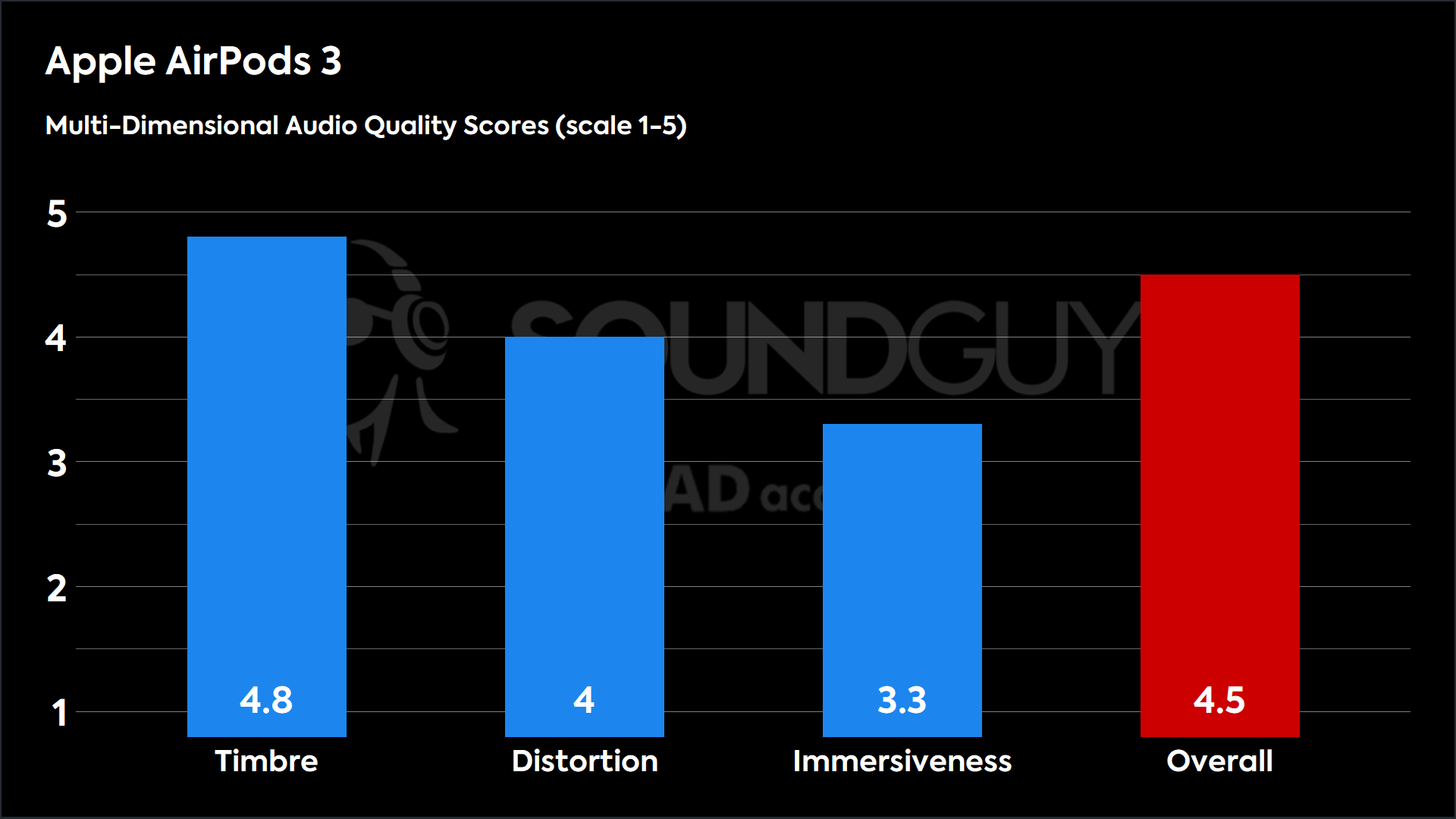
The Samsung Galaxy Buds 2 Pro is one of the best pairs of earbuds for Android phones
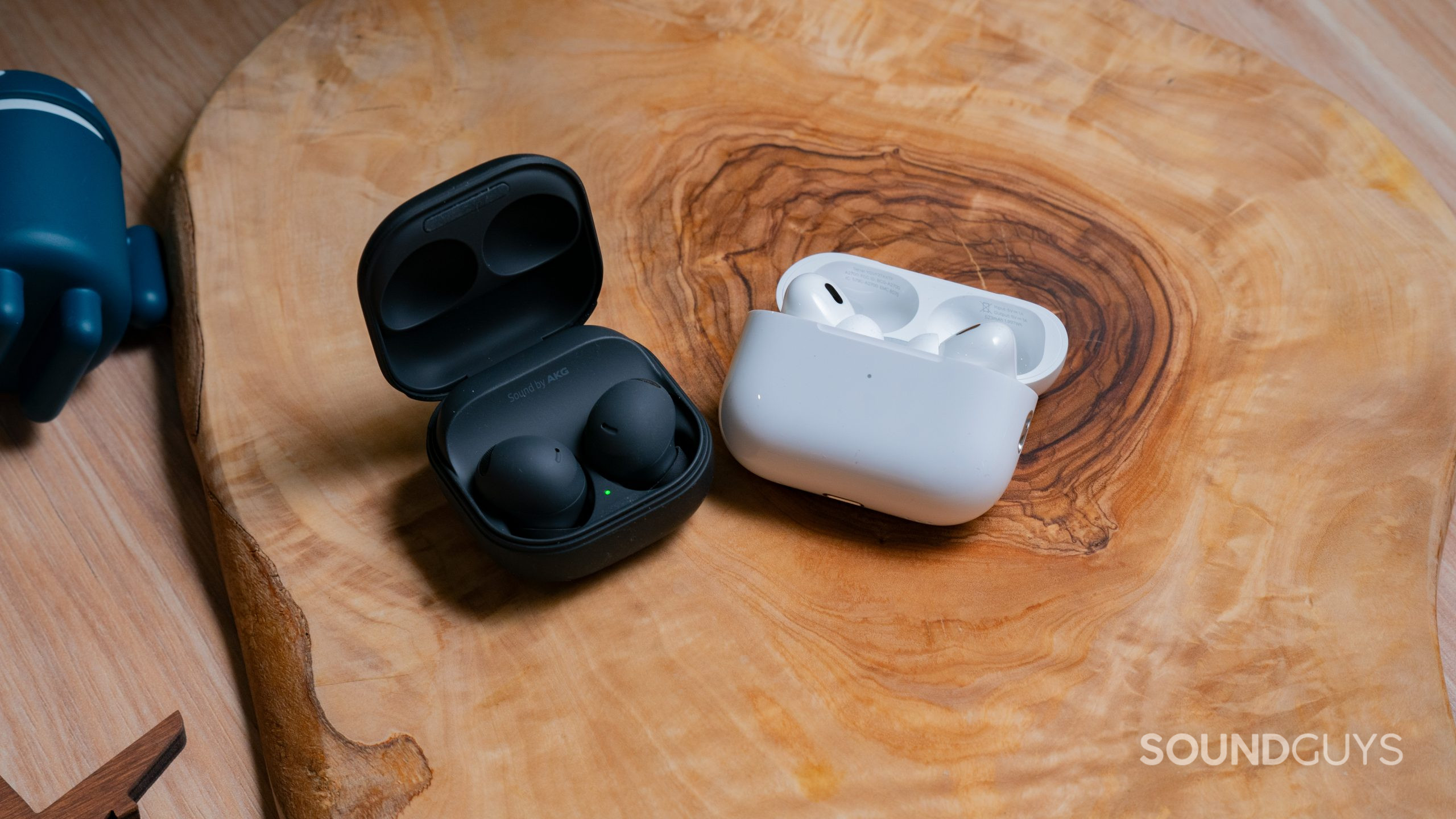
The Galaxy Buds 2 Pro features excellent noise canceling and has a host of EQ presets for you to choose from. If you have an Android phone, or even more specifically, a Samsung Galaxy phone, the Galaxy Buds 2 Pro is a steal. These buds boast an impressive IPX7 rating, very good sound and microphone quality, and a great collection of software features.
The Galaxy Buds 2 Pro case supports wireless charging and includes a USB-C cable for analog top-ups. The earbuds last nearly 5 hours on a single charge. The earbuds fit perfectly in the case, and while they don’t have additional reinforcements to stay in your ear, like fins or wings, you can still get a great fit with the ear tips provided.
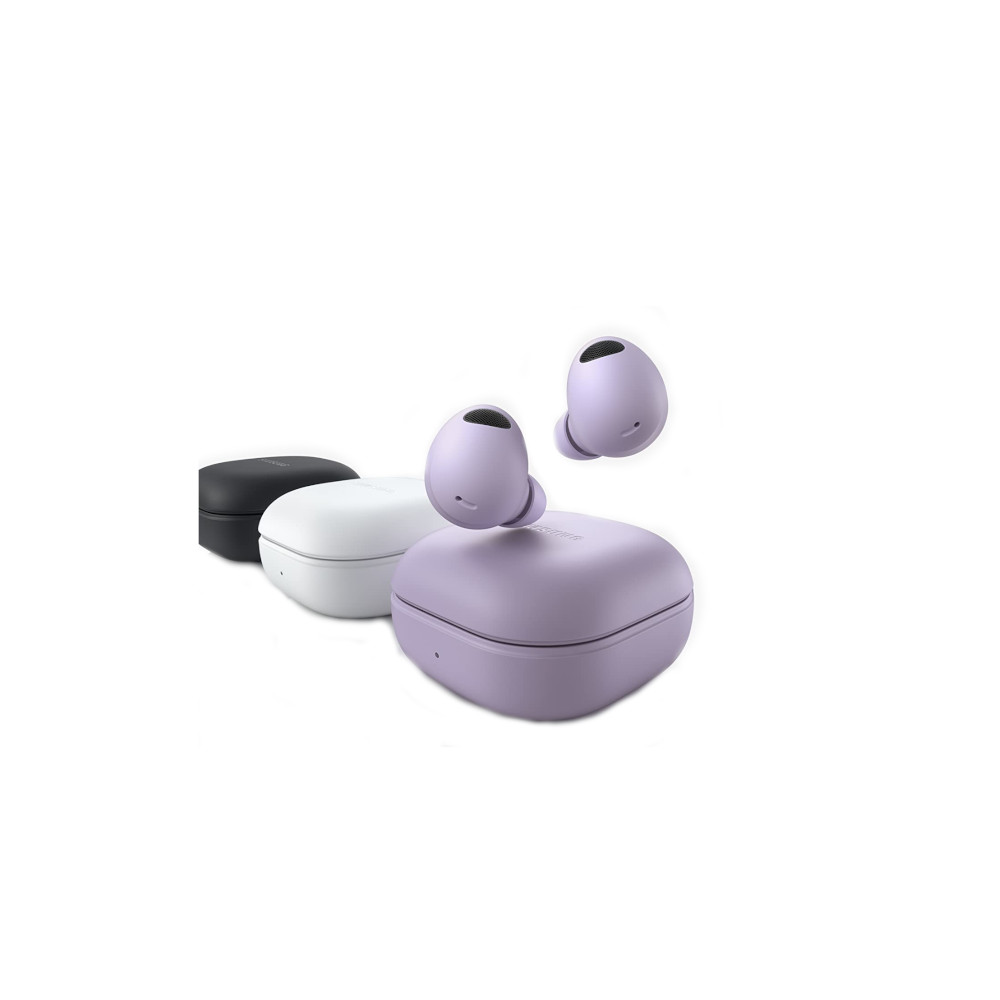
The chart below shows how the sound of the Samsung Galaxy Buds 2 Pro was assessed by the Multi-Dimensional Audio Quality Score (MDAQS) algorithm from HEAD acoustics.
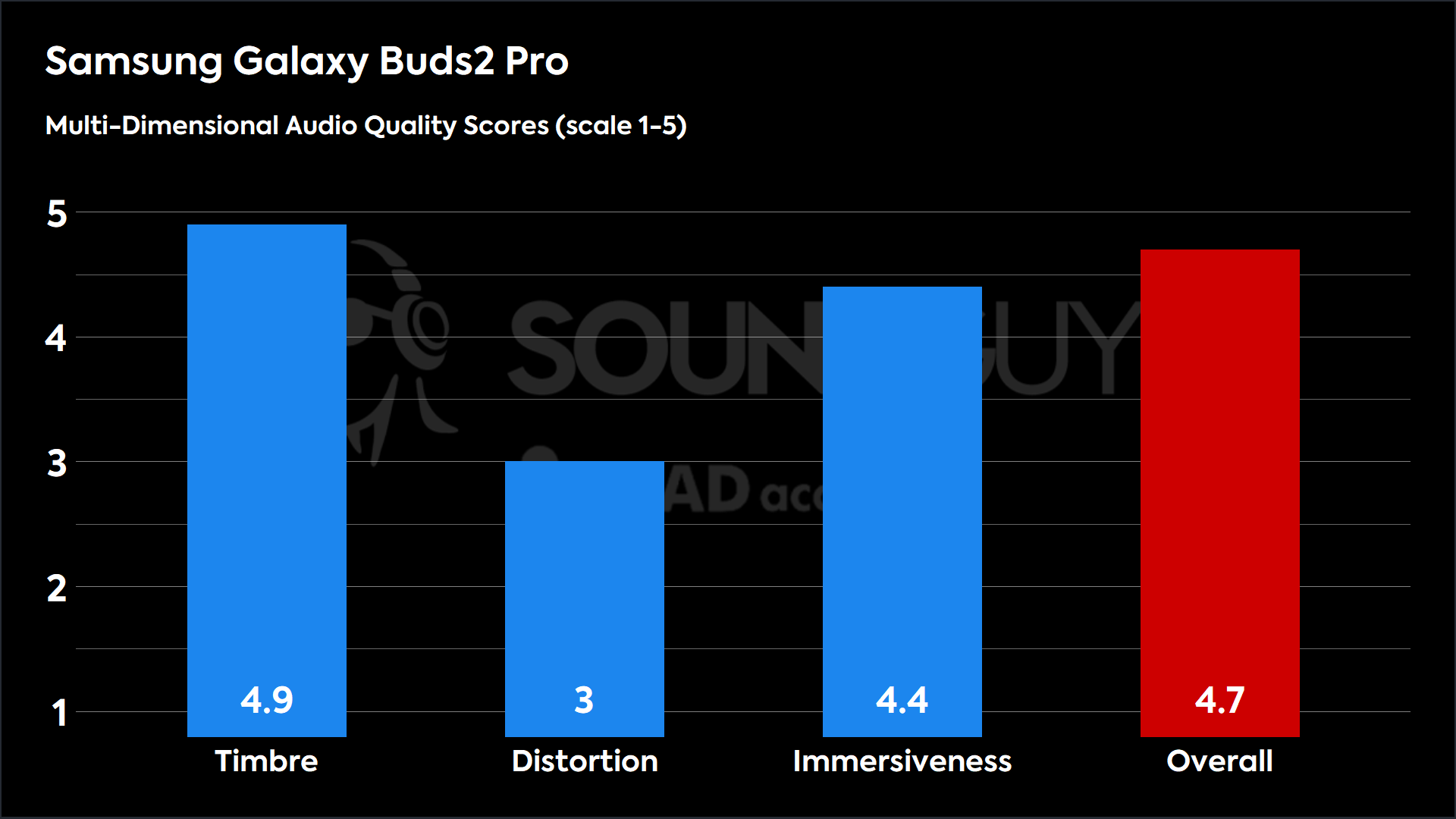
The microphone quality is quite good, but it can make it sound a little like you have a lisp at times. Take a listen for yourself:
Samsung Galaxy Buds 2 Pro microphone demo (Ideal):
Samsung Galaxy Buds 2 Pro microphone demo (Street):
Samsung Galaxy Buds 2 Pro microphone demo (Wind):
How does the microphone sound to you?
The best AirPods Pro alternatives: Notable mentions

- Amazon Echo Buds (2nd Gen): This set of smart true wireless earbuds integrates Amazon Alexa, which is great for any smart home enthusiast heavily invested in the Amazon ecosystem for merely $119 at Amazon. The noise canceling is good and even outperforms that of the original AirPods Pro.
- Anker Soundcore Space A40: These are priced right ($79 at Amazon) and ship with AAC and LDAC Bluetooth codecs, good ANC, a decent default sound, and an in-app equalizer.
- Beats Studio Buds: The first generation of Studio Buds sounds pretty good and has an IPX4 rating. Noise canceling isn’t super impressive, but the price has gone down ($99 at Amazon).
- Google Pixel Buds A-Series: Get these earbuds to save a bit of cash but get many of the same benefits as the Google Pixel Buds (2020). For only $94 at Amazon, and offers full Android integration, an IPX4 rating, and several special features. If you want more features, including ANC, consider the Google Pixel Buds Pro ($199 at Amazon). These two are best suited to Android devices.
- Jabra Elite 7 Pro: These earbuds are made to do anything, and they do just that. Unfortunately, the Elite 7 Pro go for $199 at Amazon, but you get solid features like wireless charging, a great mobile app, good mic quality, and IP57-rated earphones.
- Nothing Ear (a): If you have $100 to spend on earbuds, the Nothing Ear (a) are a good option. These jack-of-all-trades earbuds don’t excel in any particular way but also don’t have any major drawbacks. $95 at Amazon
- Nothing Ear (2): Anyone looking for reasonably priced true wireless earbuds ($149 at Amazon) with ANC will like the value-driven design here that doesn’t look or feel cheap. People who like stemmed earbuds but don’t want AirPods can gain similar squeeze controls and compatibility whether you use iOS or Android.
- Samsung Galaxy Buds 2: These are cheaper than the Galaxy Buds 2 Pro ($99 at Amazon) and boast many of the same features like ANC, Bluetooth 5.2, and fast charging. You miss out on some features like 360 audio and a high water-resistant rating, though.
- Sennheiser MOMENTUM True Wireless 3: These earbuds have an IPX4 rating and very good active noise canceling. Unusually, these wireless earbuds support aptX Adaptive, which makes them stand out for those who stream videos over patchy connections. Like other Sennheiser headphones, these earbuds sound very good and will bode well for any genre of music. They go for $169 at Amazon.
- Sony LinkBuds S: These discreet-looking earbuds cost less than the lauded Sony WF-1000XM5 but are smaller, have the same IPX4 rating, sound good, and have spatial audio. Get them for $148 at Amazon.
- Sony WF-1000XM4: These earbuds used to wear the crown for best ANC true wireless earbuds until Sony’s successor, the WF-1000XM5, came out. Still, these have many of the same features, such as Sony 360 audio and an IPX4 rating, and can be found for cheaper nowadays ($278 at Amazon).
Hold up! Something’s different:
Some of our picks’ or notable mentions’ frequency response and isolation charts were measured with our old testing system. We have since purchased a Bruel & Kjaer 5128 test fixture (and the appropriate support equipment) to update our testing and data collection. It will take a while to update our backlog of old test results, but we will update this review (and many others!) once we’re able with improved sound quality measurements and ANC performance plots. These will be made obvious with our new chart aesthetic (black background instead of white).
Thank you for bearing with us, and we hope to see you again once we’ve sorted everything out.
What you should know before buying Apple AirPods Pro alternatives
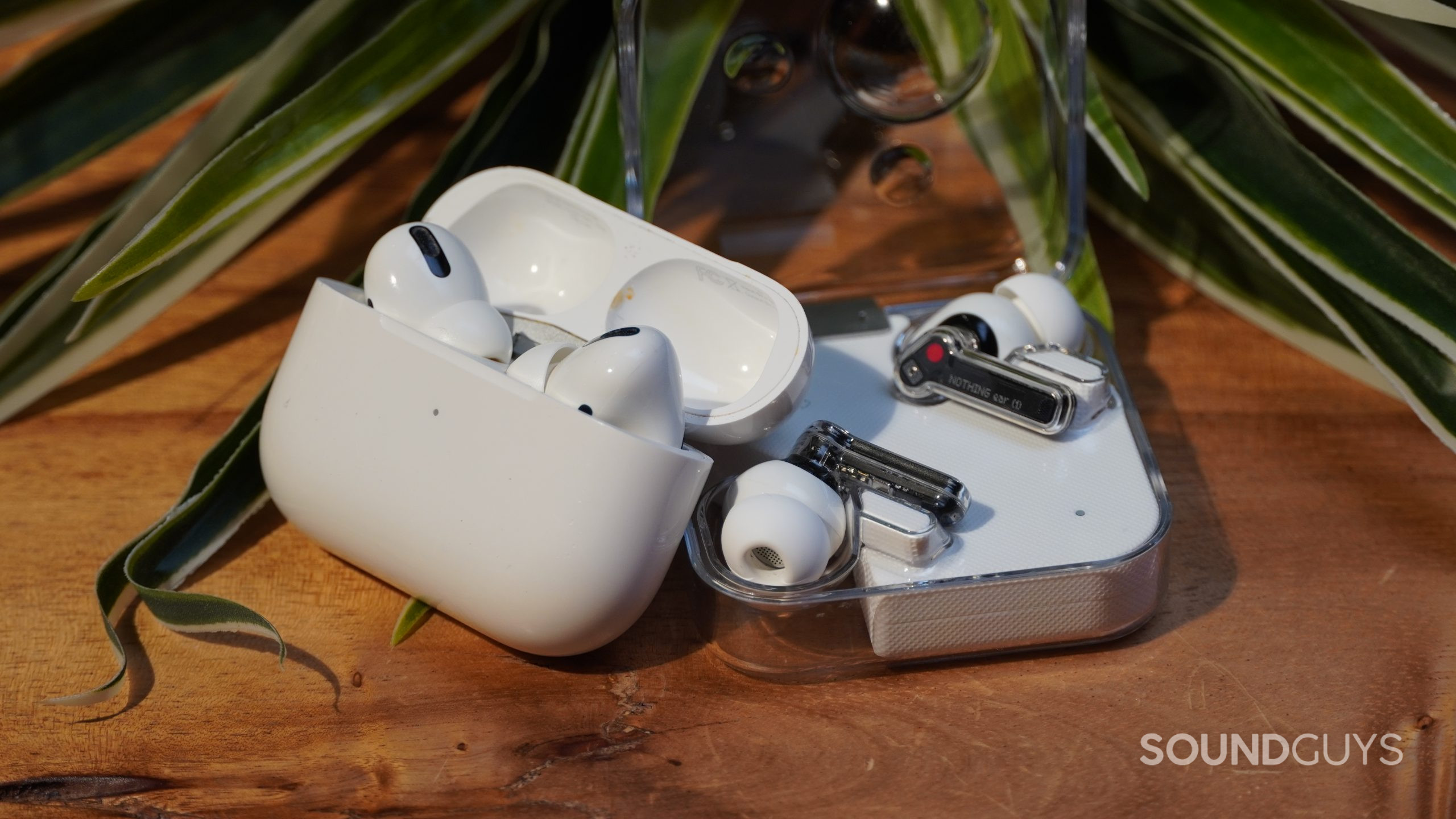
Whether you have a large collection of headsets or are just diving into your first set of pricier earbuds, we know that shopping around can be overwhelming. There are many things to consider, like sound quality, durability, isolation, fit, features, and more. We recommend that newbies read up on our comprehensive headphone buying guide, but if you just want to skim for the most important stuff, read on below.
Do non-Apple earbuds sound different from AirPods?
All earbuds have a certain sound profile, which is technically referred to as a “frequency response.” Most consumer headsets follow a similar frequency response with the AirPods Pro: boosted bass and treble relative to the mids. However, to what degree a pair of earbuds boosts or under-emphasizes these frequencies varies across the board.
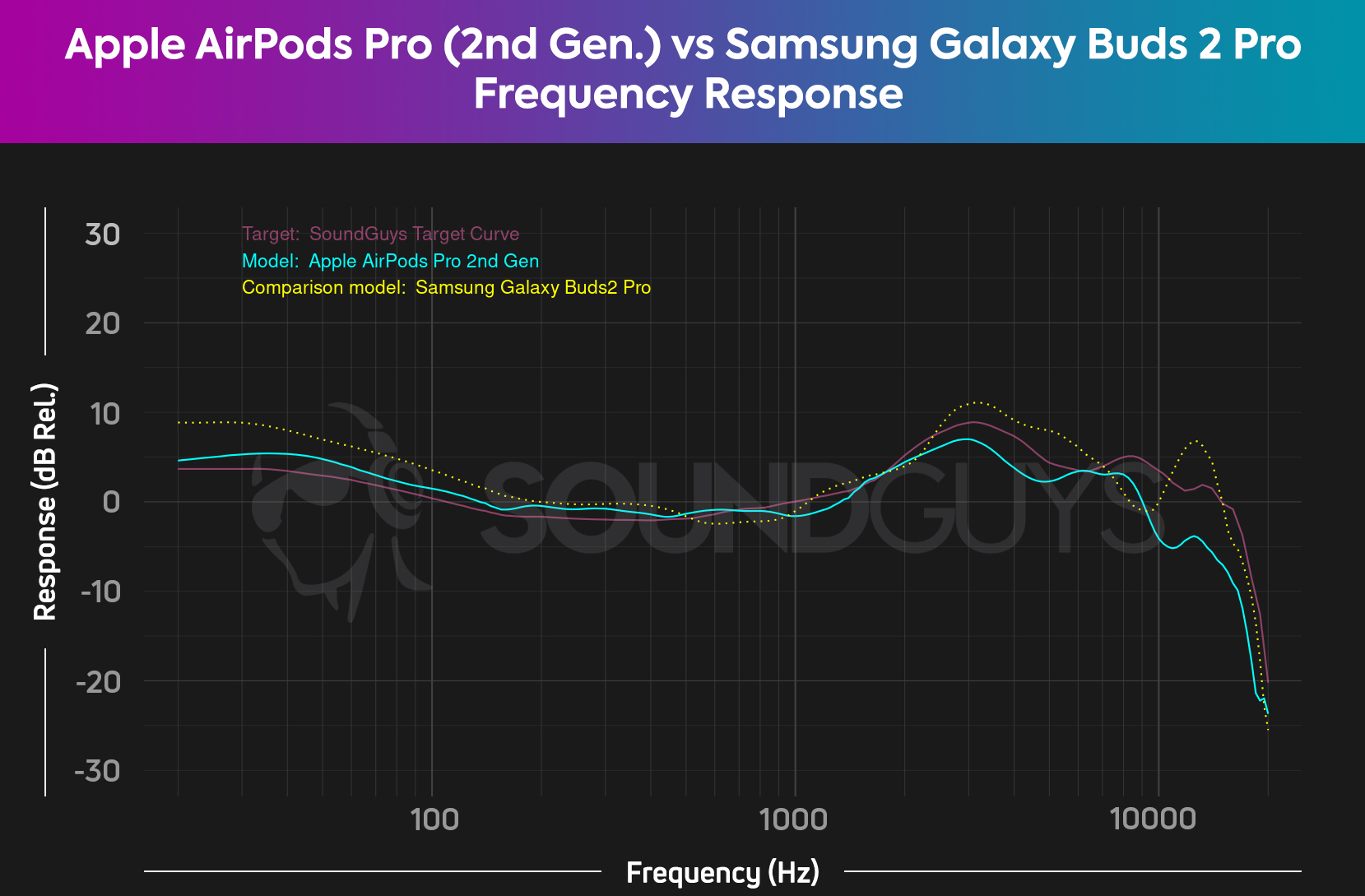
As you can see in the chart above, the AirPods Pro (2nd Gen) generally follows the shape of our house curve but has a quieter treble output than we recommend. This is different from the Galaxy Buds 2 Pro from Samsung, which has a frequency response that boosts bass and treble a bit more than the AirPods Pro (2nd Gen) does.
Ultimately, what sounds good is up to you: audio is a very subjective experience. If you like bass, more power to you. If you like treble, then there are plenty of headsets out there for you, too. A great thing about wireless earbuds is that many companion apps come with intuitive custom equalizers where you can adjust the sound to your liking. No matter what headset you get, there’s often the option for tinkering.
What is a Bluetooth codec?
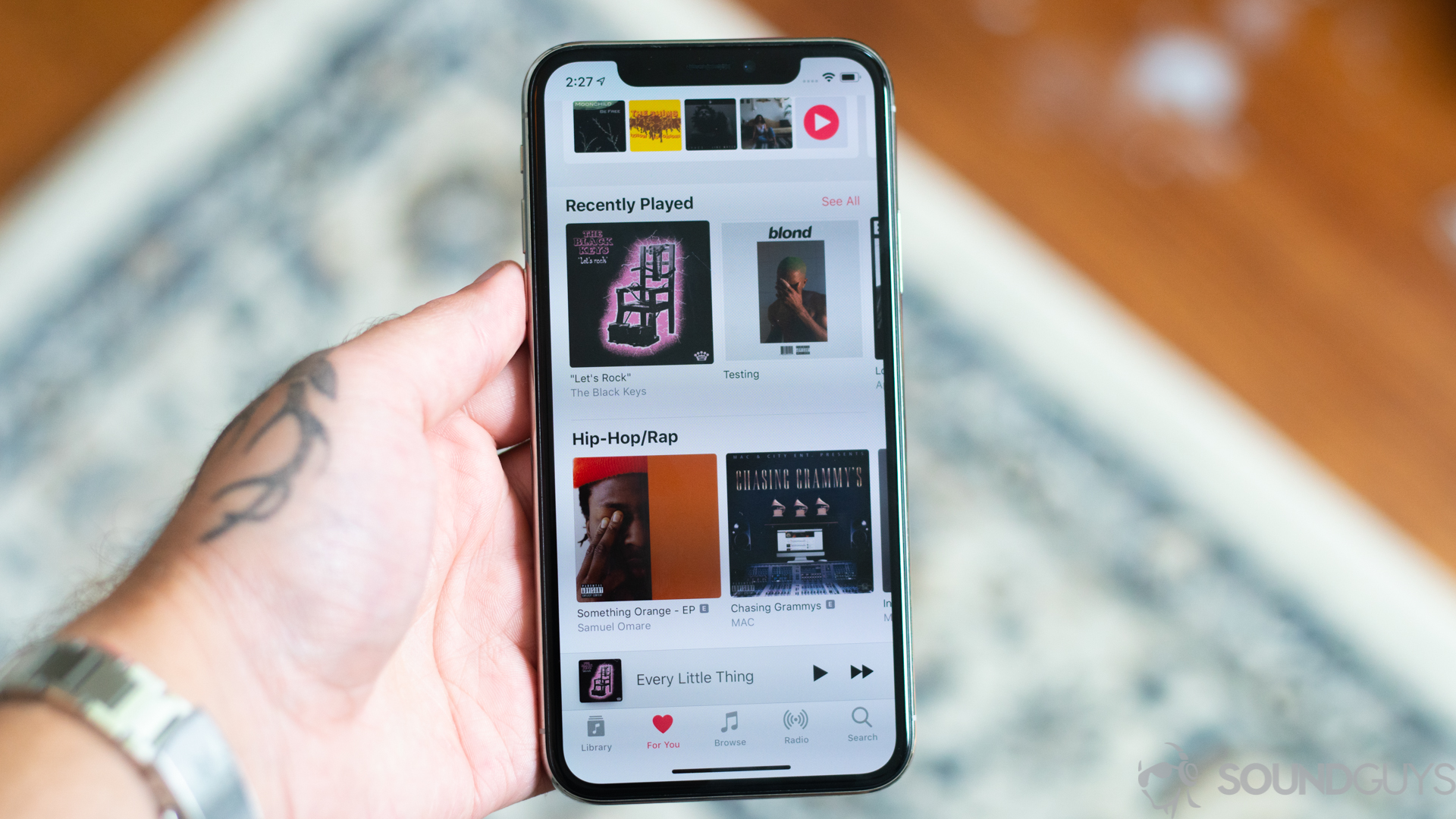
Your smartphone’s operating software determines what Bluetooth codecs you need to look out for when shopping for Bluetooth headphones. A Bluetooth codec dictates how your phone transfers audio to your headphones.
iPhone users should get something with AAC support because it’s currently the only high-quality Bluetooth codec the company’s products support. Android users, on the other hand, should invest in total wireless earbuds with aptX support; unfortunately, AAC’s performance is all over the place on Android as it demands a huge amount of processing power to stream over. All of our favorite Apple AirPods Pro alternatives support either aptX or AAC, and in some cases, both codecs are compatible.
Should you get noise canceling earbuds?
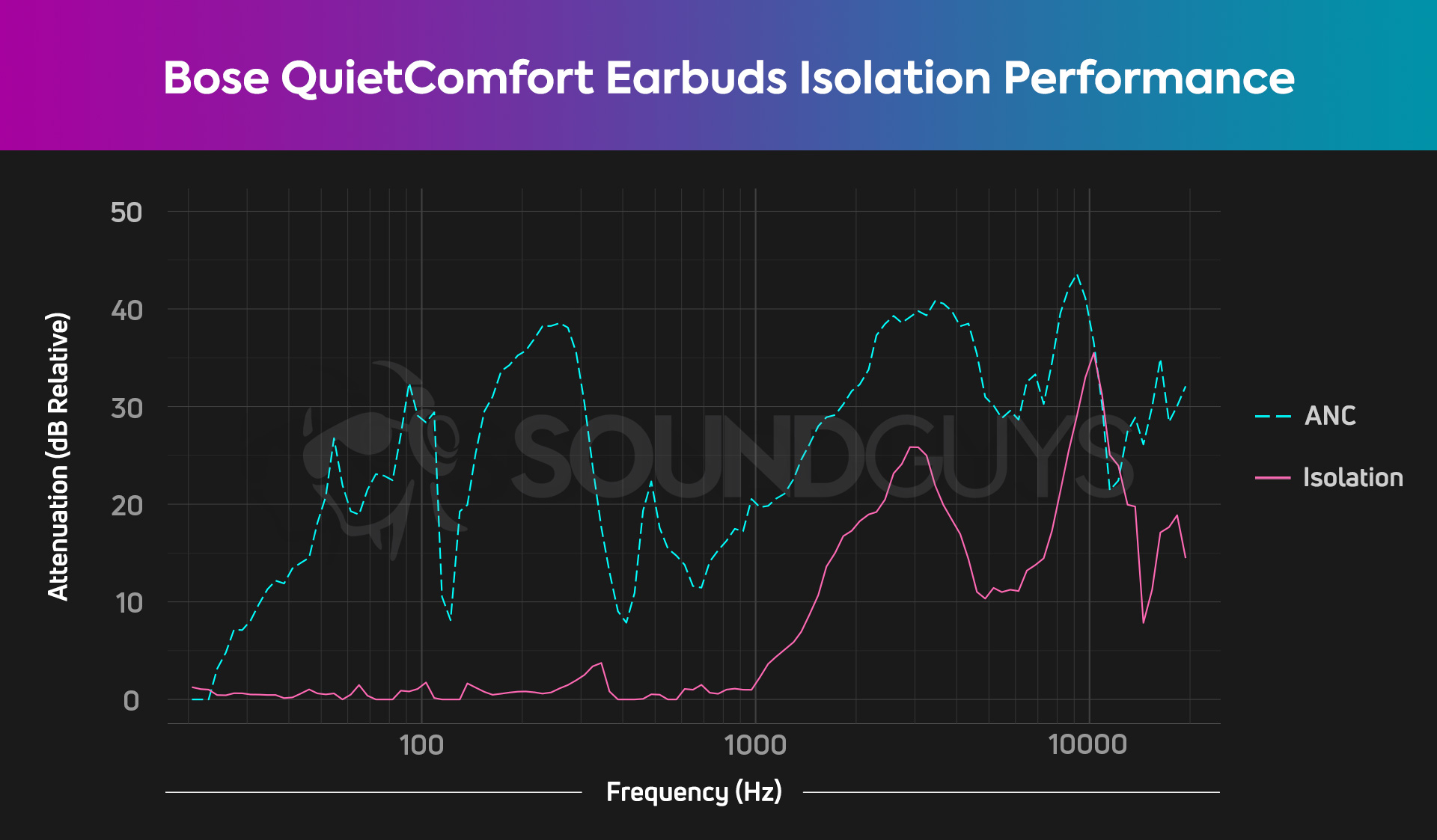
If you’re on the fence about buying a pair of noise canceling earbuds, we implore you to give them a shot, as they can protect you from noise-induced hearing loss. In fact, the earbuds work two-fold to protect your hearing while also improving the perceived clarity of your music. When you listen without noise canceling headphones, your music is subject to auditory masking: when a loud sound (e.g., external noise) makes it difficult to register a quieter one (e.g., music playback). There is one downside to ANC, though: shortened battery life. By turning off noise canceling, you can squeeze out an additional 20-40 minutes of playtime.
Although not all of our picks have active noise canceling, it’s important to remember that true wireless ANC doesn’t perform as well or as consistently as over-ear headphones. Generally speaking, noise cancelation is most effective at combating loud, droning, predictable sounds: microphones use destructive interference to nullify these sounds. Nearby chatter or clanging kitchen utensils may still break through the ANC barrier, but noises like computer fans and engines will be filtered out.
How long do true wireless earbuds last?
Due to the size limitations of true wireless earbuds, the battery cells can only supply so much power before hitting a wall. We’ve seen huge improvements in just a few years as a handful of candidates from the likes of Master & Dynamic and Beats are able to come near or exceed 10 hours of playtime on a single charge and, on the cheaper end, JLab. That, however, remains an exception. Most true wireless earbuds will grant you four or five hours of listening before needing to be topped up in the provided charging case.
Many products support some version of quick charging to compensate for the short battery life. Most of the time, this feature affords one hour of listening after being in the case for just 10 minutes.
![Apple Airpods[5] An aerial image of the Apple AirPods (first-gen), which suffice as Apple AirPods Pro alternatives.](https://www.soundguys.com/wp-content/uploads/2017/01/Apple-Airpods5-e1597329993680.jpg)
This goes hand-in-hand with poor battery performance: because truly wireless earbuds are always charging when inactive, you’re depleting the life of the battery cells much faster than you would a pair of on-ear or over-ear headphones. You may notice after a year or so of regular use that your earbuds aren’t holding much of a charge, something that original AirPods users have reported en masse. However, the latest AirPods Pro (2nd generation) comes with a battery optimization feature meant to combat that issue.
It’s a shame, but as long as you go into buying your earbuds with realistic expectations, you can still enjoy them for convenience. What’s more, many products include one or two-year warranties, and you may be able to reach out to customer support for a replacement or credit if your earbuds’ performance declines dramatically.
Ever since iOS 14, Apple has included Optimized Battery Charging for its AirPods series. This means the AirPods and AirPods Pro learn each user’s charging habits and hold off on completing a full charge cycle to 100%. Instead, the case won’t charge the buds beyond 80% capacity until needed. This is intended to increase the life cycle of Apple AirPods, and many other companies offer similar battery-saving modes on their platforms.
Why you should trust SoundGuys
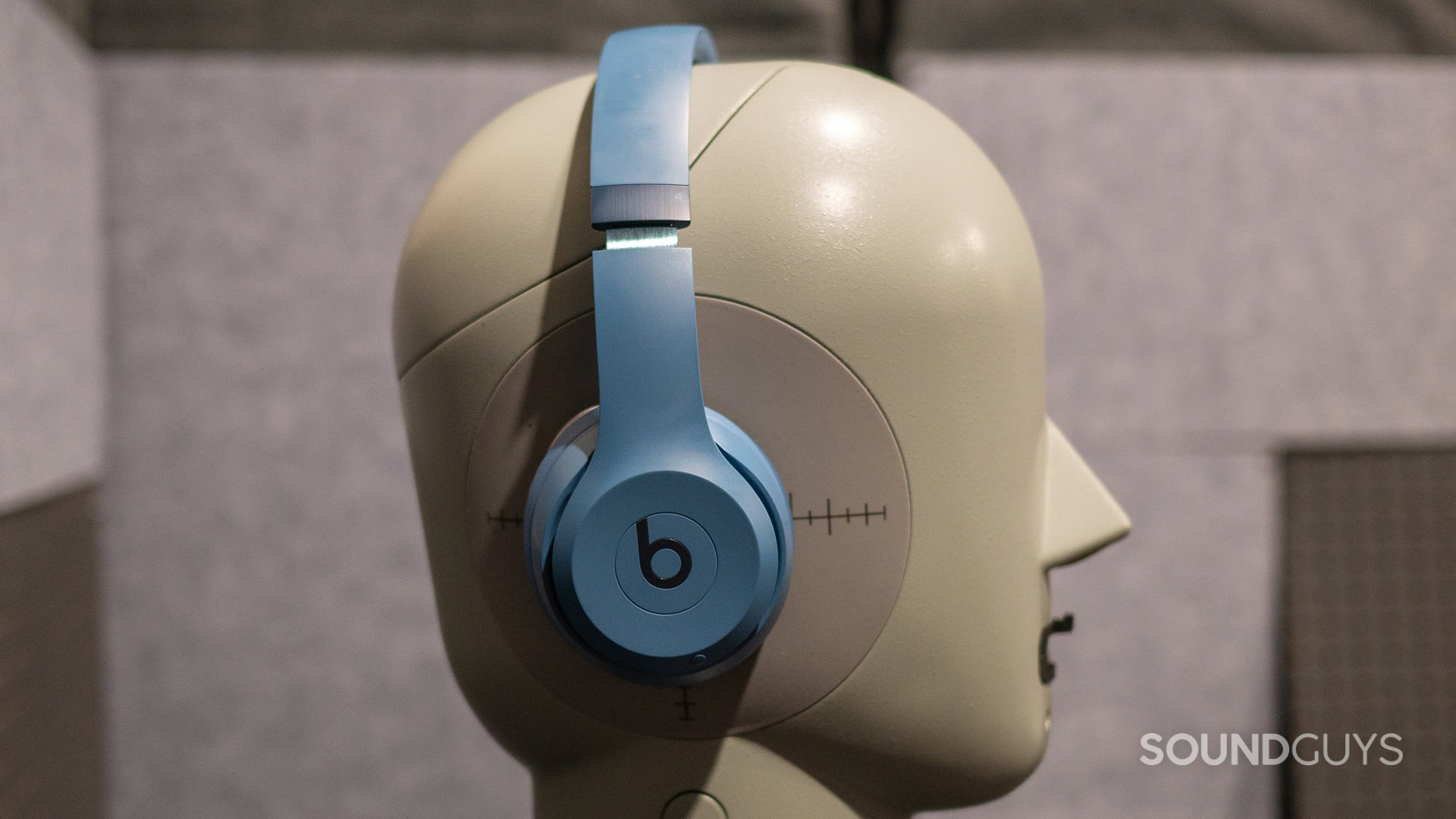
We’ve been testing true wireless earbuds since the category’s inception and take pride in our ability to show our work and reasoning behind championing one product over another. We strive to make performance measurements accessible to our readers and have the know-how, dedication, and ethics to do so — we take integrity seriously.
Everything we recommend is based on our objective measurements and subjective experiences, which have led us to feel strongly about a product. At the end of the day, we want you to be happy with your purchase or, at the very least, to close out of this tab knowing a bit more about the inner workings of audio.
Frequently asked questions about AirPods Pro alternatives
The AirPods Pro (3rd generation) will come to market; it’s just a matter of when. While there is no official confirmation, we expect them to be released in late 2024 or early 2025.
If you’re looking for something comfortable and with a good microphone, you should consider getting a pair of Bluetooth headphones for conference calls. But if you’re dead set on earbuds, the Powerbeats Pro is a good option. The buds’ microphone is more than decent, and they’re comfortable and stable thanks to their silicone ear tips and ear hooks.
The Razer Hammerhead True Wireless Pro is a collaborative project from Razer, THX, and Comply. They have wonderful sound quality due to their THX certification. Though the stemmed design doesn’t provide a lot of stability, the collaboration with Comply means these earbuds came out with a very comfortable fit, and you can replace the Comply memory foam tips with included silicone tips for a bit more stability. With the Razer Hammerhead True Wireless app, you can EQ the sound signature as well as enable Gaming Mode, which enables low-latency streaming. The Hammerhead True Wireless Pro also has active noise canceling, and it works pretty well at canceling out low-frequency noises. The microphone quality isn’t the absolute best, but overall, these are a decent pair of earbuds if you find that they’re worth $199.
The Beats Powerbeats Pro is available in black, blue, pink, ivory, blood orange, forest green, navy blue, and yellow. There’s also the Master & Dynamic MW08, which has sophisticated color options.
The H1 chip is a creation of Apple, and it is a processing chip designed to perform convenient functions, including easy Bluetooth connectivity and audio decompression. H1 chip integration just means that a set of wireless earbuds has this chip inside of it. H1 chip earbuds have longer battery life than older Apple W1 chip integrated earbuds, can sense if you are wearing one or both earbuds, use Bluetooth 5.0, and support voice-activated Siri commands. The H1 chip uses an AAC codec and is only compatible with iPhones, so Android users don’t need to pay attention to it.
We don’t recommend rolling the dice with off-brand or fake anything. The reasons for this are pretty straightforward: if (when) something goes wrong, you won’t have recourse, and you’ll also probably have a crappier product to boot. Additionally, putting anything in your ears is a lot of trust to place in a product, and a malfunctioning fake may not be the safest item to use.
Thank you for being part of our community. Read our Comment Policy before posting.